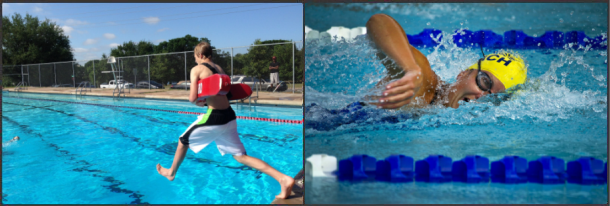To become a lifeguard in the UK you must be able to accomplish a range of swimming tasks. As well as complete the National Pool Lifeguard Qualification (NPLQ).
Being a lifeguard has many perks. Lifeguards can vary their working hours, which means other commitments are easier to work around. Lifeguards have the opportunity to create a work family and be part of a team. It is known that most leisure managers start as pool lifeguards meaning there is opportunity to progress within the leisure industry.
What things must I be able to do before becoming a lifeguard?
- Be over the age of 16
- Jump/dive into deep water
- Swim 50 metres in less than 60 seconds
- Swim 100 metres continuously on front and back in deep water
- Tread water for 30 seconds
- Surface dive to the floor of the pool
- Climb out unaided without ladder/steps and where the pool design permits
Skills for life
Being a lifeguard for life might not be the career path for you. However, lifeguarding enables for skills and qualification that can be taken into many other jobs. The NPLQ course also offer additional qualifications:
- Emergency First Aid at Work
- First Aid at Work Certificate
- Automated External Defibrillation Certificate (AED)
- Management of Anaphylaxis
How does the NPLQ qualification work?
Training is not easy. It consists of physically demanding activities such as swimming to set times, lifting casualties and diving to the deepest part of the swimming pool. Both training and assessment for the NPLQ is in three sections. Candidates must successfully pass all to attain the qualifications.
The assessment is in three sections; Practical pool assessment, Theory Assessment and Practical First Aid & CPR assessment. Assessment for the NPLQ takes place at the end of the course. It determines your knowledge and understanding of the principles of working as a pool lifeguard and assesses your ability to apply the skills and knowledge in a work-related environment.

What happens when the certificate runs out?
NPLQ renewal candidates may renew their qualification within the period of validity of their existing qualification as stated on their certificate. This will include a full assessment of lifeguard knowledge and skills by an independent assessor. Candidates must have access to the most up to date copy of ‘The Lifeguard’ manual prior to assessment.
The following is required to be completed by candidates prior to the renewal assessment of their qualification to demonstrate their ongoing professional competence:
20 hours Continued Professional Development within the last two years from the date of previous assessment covering content from the NPLQ syllabus:
- In-water swimming pool rescue skills (at least 4 hrs)
- CPR (at least 4 hrs)
- First Aid (at least 4 hrs)
- Lifeguard theory (at least 4 hours)
Continued Professional Development can be achieved by:
- Attendance at Lifeguard ongoing training and competency assessment* (strongly recommended)
- Attendance at alternative training, face-to-face or online, relating to In-water swimming pool rescue skills, CPR, First Aid and Lifeguard theory
Lifeguard Services
Lifeguard services provide an easy way to hire a fully qualified lifeguard for permanent, short and long term hire. We provides an easy way to make sure your allocated water is in safe hands. To find our more and book please see our booking page.




Leave a Reply